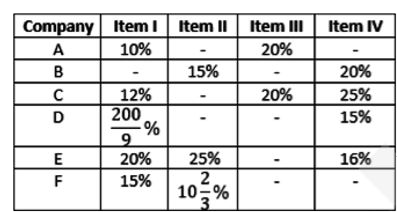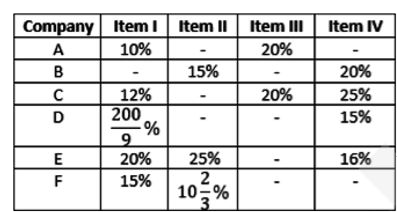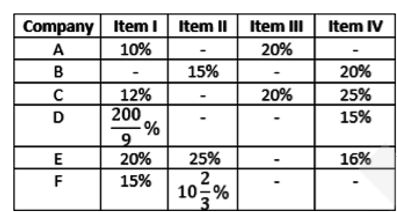Teenagers shoe company sells the shoes whose prices i.e., cost prices and selling prices are the multiples of either 13,14,15,16,17,18 or 19, starting from ₹ 399 to ₹ 699 (i.e.,399≤CP/SP≤699) What can be the maximum profit of the company?
₹ 292
₹ 398
₹ 298
₹ 300
The correct Answer is:C
To solve the problem of finding the maximum profit for the Teenagers Shoe Company, we need to identify the cost price (CP) and selling price (SP) that are multiples of the given numbers (13, 14, 15, 16, 17, 18, or 19) within the specified range of ₹399 to ₹699.
1. Identify the Cost Price (CP):
- The cost price must be a multiple of either 13, 14, 15, 16, 17, 18, or 19 and should be at least ₹399.
- Check if ₹399 is a multiple of any of these numbers:
- 399 ÷ 13 = 30.69 (not a multiple)
- 399 ÷ 14 = 28.5 (not a multiple)
- 399 ÷ 15 = 26.6 (not a multiple)
- 399 ÷ 16 = 24.94 (not a multiple)
- 399 ÷ 17 = 23.47 (not a multiple)
- 399 ÷ 18 = 22.17 (not a multiple)
- 399 ÷ 19 = 21 (is a multiple)
- Therefore, the cost price (CP) is ₹399.
2. Identify the Selling Price (SP):
- The selling price must be a multiple of the same numbers and should not exceed ₹699.
- Start checking from the maximum possible selling price of ₹699 downwards:
- Check if ₹699 is a multiple of any of the numbers:
- 699 ÷ 13 = 53.77 (not a multiple)
- 699 ÷ 14 = 49.93 (not a multiple)
- 699 ÷ 15 = 46.6 (not a multiple)
- 699 ÷ 16 = 43.69 (not a multiple)
- 699 ÷ 17 = 41.12 (not a multiple)
- 699 ÷ 18 = 38.83 (not a multiple)
- 699 ÷ 19 = 36.79 (not a multiple)
- Since 699 is not a multiple, check lower values:
- The next multiples for each number:
- For 13: 13 x 53 = 689
- For 14: 14 x 49 = 686
- For 15: 15 x 46 = 690
- For 16: 16 x 43 = 688
- For 17: 17 x 40 = 680
- For 18: 18 x 37 = 666
- For 19: 19 x 36 = 684
- The closest valid multiple of 19 is ₹684.
3. Calculate the Maximum Profit:
- Profit is calculated as:
Profit=Selling Price−Cost Price
- Substitute the values:
Profit=684−399=285
Conclusion:
The maximum profit the Teenagers Shoe Company can achieve is ₹285.
- The cost price must be a multiple of either 13, 14, 15, 16, 17, 18, or 19 and should be at least ₹399.
- Check if ₹399 is a multiple of any of these numbers:
- 399 ÷ 13 = 30.69 (not a multiple)
- 399 ÷ 14 = 28.5 (not a multiple)
- 399 ÷ 15 = 26.6 (not a multiple)
- 399 ÷ 16 = 24.94 (not a multiple)
- 399 ÷ 17 = 23.47 (not a multiple)
- 399 ÷ 18 = 22.17 (not a multiple)
- 399 ÷ 19 = 21 (is a multiple)
- Therefore, the cost price (CP) is ₹399.
- The selling price must be a multiple of the same numbers and should not exceed ₹699.
- Start checking from the maximum possible selling price of ₹699 downwards:
- Check if ₹699 is a multiple of any of the numbers:
- 699 ÷ 13 = 53.77 (not a multiple)
- 699 ÷ 14 = 49.93 (not a multiple)
- 699 ÷ 15 = 46.6 (not a multiple)
- 699 ÷ 16 = 43.69 (not a multiple)
- 699 ÷ 17 = 41.12 (not a multiple)
- 699 ÷ 18 = 38.83 (not a multiple)
- 699 ÷ 19 = 36.79 (not a multiple)
- Since 699 is not a multiple, check lower values:
- The next multiples for each number:
- For 13: 13 x 53 = 689
- For 14: 14 x 49 = 686
- For 15: 15 x 46 = 690
- For 16: 16 x 43 = 688
- For 17: 17 x 40 = 680
- For 18: 18 x 37 = 666
- For 19: 19 x 36 = 684
- The closest valid multiple of 19 is ₹684.
- Profit is calculated as:
Profit=Selling Price−Cost Price
- Substitute the values:
Profit=684−399=285
The maximum profit the Teenagers Shoe Company can achieve is ₹285.
Topper's Solved these Questions
Similar Questions
Given below is a table which tells us about the profit or loss% made on 4 items sold by 6 companies, A, B, C, D, E, and F.
Some of the data is missing in the table which one has to calculate using the given data.

The average selling price of item I sold by company C and company A is Rs. 3493. The cost price of the item I for company A and company C is in the ratio of 5 : 4. Find the % by which the selling price of this item sold by Company C is greater or less than the selling price of this item sold by company A. Both companies made profit on the item.View SolutionA small and medium enterprise imports two components A and B from Taiwan and China respectively and assembles them with other component to form a toy. Component A contributes to 10% of production cost while component B contributes to 20% of production cost. Usually the company sells this toy at 20% above the production cost. Due to increase in the raw material and labour cost in both the countries, component A became 20% costlier and component B became 40% costlier. Owing to these reasons the company increased its selling price by 15%. Considering that cost of other components does not change, what will be the profit percentage if the toy is sold at the new price? 15.5% b. 25.5% c. 35.5% d. 40%
View Solution
Knowledge Check
- Question 1 - Select One
Teenagers shoe company sells the shoes whose prices i.e., cost prices and selling prices are the multiples of either 13,14,15,16,17,18 or 19, starting from ₹ 399 to ₹ 699 (i.e.,399≤CP/SP≤699) What can be the maximum profit of the company?
ARs. 292BRs. 398CRs. 298DRs. 300 - Question 2 - Select One
Answer the questions on the basis of the information given below.
Abdul, Bikram and Chetan are three professional traders who trade in shares of a company XYZ Ltd. Abdul follows the strategy of buying at the opening of the day at 10 am and selling the whole lot at the close of the day at 3 pm. Bikram follows the strategy of buying at hourly intervals: 10 am, 11 am, 12 noon, 1 pm. and 2 pm, and selling the whole lot at the close of the day. Further, he buys an equal number of shares in each purchase. Chetan follows a similar pattern as Bikram but his strategy is somewhat different. Chetan's total investment amount is divided equally among his purchases. The profit or loss made by each investor is the difference between the sale value at the close of the day less the investment in purchase. The "return" for each investoris defined as the ratio of the profit or loss to the investment amount expressed as a percentage.
On a day of fluctuating market prices, the share price of XYZ Ltd. ends with a gain, i.e., it is higher at the close of the day compared to the opening value. Which trader got the maximum return on that day?ABikramBChetanCAbdulDBikram or Chetan - Question 3 - Select One
Mohan earns a profit of 20% selling a jean at 15% discount on printed price. The ratio of the cost price to printed price of the jean is
A 17:24
B. 17:34
C. 16:13
D. 21:23ADBBCCDA
Given below is a table which tells us about the profit or loss% made on 4 items sold by 6 companies, A, B, C, D, E, and F.
Some of the data is missing in the table which one has to calculate using the given data.

The ratio of the selling price of item I and II for company A is 4 : 3. Find the profit or loss% made on item II if the ratio of their cost price was 8 : 9. It is known that company A made profit on item I.View SolutionHealthcare Ltd. Is a company engagged in production of organic food. Presently It sells It products through indirect channels of distribution. The company is planning to start its own show rooms and online portals. The financial manager suggested to use debt to ivest in own showrooms and online protals.
Company plans to raise debt. capital of Rs. 40 lakhs a loan from ICICI bank of 10% interest. The present capital base of the company is 9 lakhs equity shares of Rs. 10 each. The rate of tax is 30%
In the context of above case-
(a) Assuming expected rate of return same as current year i.e., 15% do you think the decision to use debt is justified.
Show your working clearly.View SolutionGiven below is a table which tells us about the profit or loss% made on 4 items sold by 6 companies, A, B, C, D, E, and F.
Some of the data is missing in the table which one has to calculate using the given data.

The selling price of the items sold by Company E was Rs. 2400, Rs. 2100, Rs. 1870 and Rs. 2030 in the order from I to IV. They made a profit on items I and IV while they lost money on item II. Find the profit or loss made on item III if the company made an overall profit of 5% by selling all the items.View SolutionA manufacturing company 'P' sells a Desert cooler to a dealer A for Rs. 8100 including sales tax (under VAT). The dealer A sells it to a dealer B for Rs.8500 plus sales tax and the dealer B sells it to a consumer at a profit of Rs.600. If the rate of sales tax (under VAT) is 8%, find (i) the cost price of the cooler for the dealer A (i) the amount of tax received by the Government (ii) the amount which the consumer pays for the cooler
View SolutionA petrol pump dealer adds 2 litres of kerosene with every 8 litres of petrol before selling the petrol to his customers. The kerosene is actually 25% cheaper than the petrol. While selling it to his customers, he gives 10% less than what he claims to give and mark the price up by 71% with comparison to the cost price of petrol, What is the overall profit (%) earned by the dealer?
View Solution

